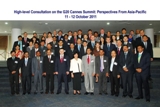Vice Minister of Finance participated in the "High Level Consultation on the Cannes G20 Summit: Perspectives from Asia-Pacific"

On October 11 and 12, the Vice Minister of Finance, Rui Manuel Hanjam, and his delegation, traveled to Bangkok for the purpose of participating in the high level consulting meeting convened and organized by the United Nations Economic and Social Commission for Asia and The Pacific - UNESCAP.
UNESCAP wanted to involve representatives of 29 Asia and Pacific countries, including China, Japan, USA and Singapore, in a debate on current issues and, in particular, newsworthy in the global economic outlook, to give a voice to these country representatives in expressing their concerns and perspectives, enriching and stipulating aspects to be included in Schedule 6 of the G20 Summit to be held in Cannes, France, on November 3 and 4, 2011.
In the aftermath of an economic recession of global impact, with particular focus on the Euro Zone and the United States of America, and that reflected in the developing countries, the countries involved were unanimous in recognizing the need to promote a transparent and inclusive policy, encouraging the participation and commitment of all countries, both developed and developing, with the ultimate goal of achieving sustainable economic growth.
To this end, the group proposed the inclusion of the following key aspects on the agenda of the 6th Summit of the G20: implementation of measures to regulate food prices, increasing agricultural productivity and regional food security of the poorer, developing mechanisms to finance infrastructure, consolidation of financial regulations in order to enjoy protection against market fluctuations, implementation of measures for managing capital; emphasis on restoring confidence and strengthening the coordination and commitment between developed and the developing world.
In his speech, the Vice Minister of Finance focused on the perspective and position of Timor-Leste over the current economic scenario, increasing inflation, the volatility of food prices, especially the fact that Timor-Leste has a high rate of imports, and the financial system adopted, questioning the other participants about how an underdeveloped country can grow and thrive in the face of economic recession in developed countries, where Timor-Leste has attempted to adopt their financial model and adjust it to its regional characteristics.
In this sense, Rui Manuel Hanjam explained that Timor-Leste has sought to minimize the risk of global recession by diversifying the assets of oil revenues, by adopting a policy of transparency and accuracy, where the Petroleum Fund receipts are regulated by the Estimated Sustainable Income. Thus, the intention is to achieve sustainable economic growth and invest in other sectors, enabling the country to give up an economy dependent on oil revenue.
At the financial system level it has shown that the development of the program will allow the poorest families, and with low incomes, to have access to financial services, namely savings, loans and insurance. Such a program would allow households to ensure the health and education of their children and provide the acquisition of micro-credits to create small businesses, jobs and livelihoods.
The participation of the Timor-Leste delegation was praised by the other participants, in particular due to the active role of the Vice Minister of Finance in the discussions, the content of his contributions and interventions, and the emphasis given to development and progress that has been earned by Timor-Leste, despite being one of the youngest countries in Asia.
According to Rui Manuel Hanjam, despite the fact that Timor-Leste still has a long way to go and hard work to be undertaken, its participation in meetings of this magnitude allows the world, in this case the G20 and the Asia and the Pacific countries, to know its needs, priorities and concerns, act in conformity with them and establish bonds of cooperation at international level that will give way to the country to grow and cope with the vicissitudes plaguing the financial markets.










































